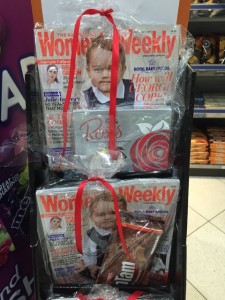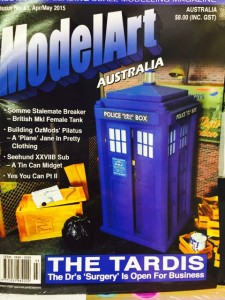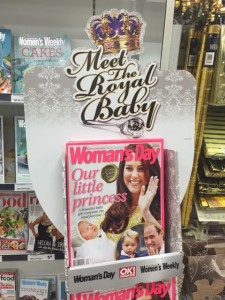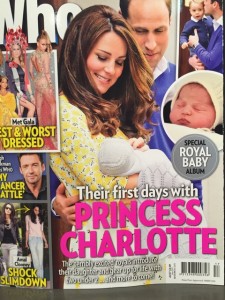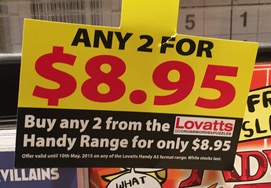Yesterday, I lodged another submission with the ACCC in relation to the application by the MPA to trial new magazine supply rules for newsagents. Click here to download the submission. The submission is also on the public register of the ACCC.
Like my first submission which the ACCC already has to consider, this submission was made on behalf of newsXpress members, based on my experience through Tower Systems serving 1,800+ newsagents and in pursuit of fairness for all newsagents. Here is the submission in full:
——————
Our view remains that the proposed MPA Pilot is ill-conceived, poorly constructed and not appropriate to meet the public benefit claims made in Section 4 of the application.
No information was presented at the Pre-Decision Conference or since to address the concerns raised in the newsXpress submission of April 23, 2015 nor the oral submissions newsagents at the Pre-Decision conference.
We urge the ACCC to embrace the opportunity to more thoroughly explore the anti-competitiveness of current and proposed magazine supply arrangements to newsagents compared to those applied to competitors of newsagents. While this issue is considerably larger than the issue of the Pilot, it goes to the heart of the future of the small business newsagency channel in Australia.
While the Pilot has been proposed to test what is claimed to be a new approach to the supply of magazines, we note it only relates to newsagents.
Competitors of newsagents are already treated with supply rules considerably more beneficial than the magazine supply rules the MPA proposes to trial for newsagents.
This difference between the supply of magazines to newsagents versus their competitors sits at the core of concerns held by newsXpress and newsagents more generally. The proposed Pilot does nothing to address these concerns.
At its heart, this Pilot seeks to test the continuation of magazine supply rules to newsagents that ensure their inability to compete with supermarkets, petrol outlets and convenience stores in the magazine category.
PRE-DECISION CONFERENCE
Every newsagent who presented to the conference spoke against the proposed magazine supply rules at the heart of the Pilot.
The MPA did not directly address any specific issue raised by newsagents nor did it directly address the comprehensive and specific complaints raised by newsXpress. Instead, the MPA relied on generalities.
Considering various points made by MPA and Bauer Media representatives at the conference, there is a gap between what has been documented to the ACCC about the Pilot and what has been said will be done as part of the Pilot.
For example, newsXpress and others expressed concern that the Pilot is to test rules that deny newsagents the opportunity to early return magazines. On page 4 of the minutes of the Pre-Decision conference we can see Mr Varricchio of Bauer Media and the MPA to say the MPA plans to allow early returns after 30 days. While we say the 30-day moratorium on early returns is unfair, it is not referred to in the documentation submitted to the ACCC for authorisation.
Mr Varricchio advised that newsagents participating in the pilot will have control over the range of magazines they stock. This is not covered in the submission from the MPA to the ACCC. There has been no evidence presented by the MPA as to the extent of control newsagents could have over the range of magazines they stock, whether the claimed control is being or can be applied uniformly, what the claimed engagement of participating newsagents looks like for them in the Pilot and in the future and or the magazine distributor processes to be put in place to enable such newsagent control over the range of magazines they stock.
Ms Azer, Director of the MPA, said the MPA would use POS data, among other data, to research how customers shop the magazine category. We note that while such data has been available for years, the MPA has made no effort to access same.
Mr Alf Maccioni, CEO of the Australian Newsagents’ Federation, told the Pre-Decision conference that the ANF had informed its members about the Pilot, with articles in newsagency magazines and newsletters. We can only find brief and passing comment about the Pilot by the ANF: to its members once in one paragraph in its magazine; and, once in as a topic in a general email to members. In neither case did the ANF adequately inform its members. We therefore say the ANF itself is not appropriately informed to speak on behalf of newsagents on this topic.
The most comprehensive information from the ANF information was published May 6, 2015. The ANF has not actively engaged with its members about the Pilot.
Every newsagent who spoke at the Pre-Decision conference spoke against the Pilot rules and the inequity of newsagent magazine distribution arrangements. No newsagent endorsed or supported the position taken by the ANF.
While the Pre-Decision conference was a welcome airing of concerns, the disconnect between claims made by the MPA and the documentation supplied by the MPA is considerable. Newsagent concerns about the disconnect are heightened because of a lack of trust that has built up over decades of oversupply and anti-competitive treatment.
HOW NEWSXPRESS FORMED ITS VIEWS
newsXpress actively sought feedback from its members at face to face meetings, via a private online forum, through face to face in store visits and through thorough telephone consultations.
The concerns raised by newsXpress are the concerns of the vast majority of its members following this comprehensive consultation process.
Following the Pre-Decision conference, newsXpress invited further feedback from members and this feedback has helped inform the views reflected in this submission including our advice that all concerns in the initial submission remain of concern to us.
MPA NOT PRERESENTATIVE OF ALL PUBLISHERS
The MPA is made up of three publishers, less than 5% of all magazine publishers in Australia. The vast majority of publishers who supply magazines to the newsagency channel have not been consulted as part of this process yet the Pilot seeks to test magazine supply rules that will impact their businesses.
It appears to us the Pilot has been constructed for the benefit of MPA members to the possible detriment of newsagents and other magazine publishers.
The MPA developed its Pilot and associated rules without consultation with newsagents. While it sought endorsement from the ANF, there has been no consultation with newsagents by the MPA nor by the ANF.
Any Pilot ought to be constructed with a more representative group of stakeholders including more publisher representatives and more newsagents.
WHERE ARE THE SAVINGS?
The MPA says that the Pilot is about reducing costs. There is nothing in the Pilot that reduces costs for newsagents and no evidence was presented to the Pre-Decision conference about expected cost savings for newsagents. It appears to us that the cost savings will be to the benefit of the magazine distributors and some magazine publishers over others.
Whereas newsagent competitors can be certain they will not be supplied more magazines than they have space to display, newsagents have no such certainty.
The only way for newsagents to reduce costs associated with magazines would be for them to be supplied such that more than 60% of all stock of each magazine title supplied is sold within 30 days and that full copy returns are eliminated.
IF THE MPA WAS SERIOUS
If the MPA was serious about its intent to optimise the supply of magazines to newsagents and to assist newsagents to more efficiently manage the magazine category (MPA ACCC application 4.a) it would have undertaken a study of the current performance of newsagency businesses to uncover the most efficient, the most successful at year on year sales uplift and the most engaged with the category. It would have thoroughly analysed these businesses and provided best practice advice to the newsagency channel.
Coming at the problem as a supply problem but not looking completely at the supply challenges and issues, the MPA has come up with a draft set of rules, what they call a Code of Conduct, that inadequately address the key financial and operational concerns of newsagents, the key factors which drive current newsagent behavior.
If the MPA was serious about its intent to optimise the supply of magazines to newsagents and to assist newsagents to more efficiently manage the magazine category it would engage with the magazine distributors on:
- Supplying magazines based on actual sales data supplied by newsagents and to a sell-through target which makes these magazines financially viable for newsagents. As put already by newsXpress, the print run / supply matrix proposed in the draft rules are not viable for newsagents for most categories of titles noted.
- Understanding from each newsagent the total space available for magazines so as to put in place rules to ensure no supply beyond the physical space allocated to magazines.
- Ensuring newsagents had absolute control over all new titles to carry.
- Stopping the need for newsagents to return unsold stock. The current system requires many newsagents to pay to return stock that has not sold while not giving those newsagents the ability to control supply.
Instead, the MPA, and in particular the Bauer Media controlled Network Services, has participated in a process which as recently as this past week has seen newsagents reissued magazines which have failed, newsagents supplied magazines to a volume based on previous sales which will deliver a loss-making sell through rate of 40% or less and introduced new titles without any regard as to their appropriateness for the newsagent businesses to which they have been sent.
In short, for all its statements of wanting to help newsagents some organisation in the MPA have most recently been treating newsagents in ways which are contrary to what are claimed to be the goals of the Pilot.
THE DISCONNECT OF COMMERCIAL REQUIREMENTS
At the heart of the unprofitability of magazines for newsagents is the commercial requirements of the two main magazine distributors Network Services (owned by Bauer Media) and Gordon and Gotch (owned by PMP Limited).
Gotch and Network are effectively trucking companies – they make money on delivering bundles of magazines. They have complete control over what they ship to newsagents whereas they to not have the same control over what they ship to all other magazine retailers.
The ability of Gotch and Network to control magazine supply to newsagents is vital to their commercial performance. It is understandable that Gotch and Network make decisions to serve their commercial needs ahead of newsagents.
The supply decisions of Gotch and Network are the single biggest factor in the financial losses endured by newsagents from magazines as well as the single most significant driver of behavior of newsagents toward magazines.
The impact of deregulation has been Gotch and Network having less control over the volume of magazines distributed outside the newsagency channel. With newsagents the only channel over which they do have control through pre-deregulation contracts distributors engage in practices that have driven up costs to newsagents, creating the problem the MPA says it wants to address.
WHY THE IMPACT OF THE 1999 DEREGULATION NEEDS TO BE ASSESSED
At the heart of the Pilot is the goal to optimise the supply of magazines to newsagents and to assist newsagents to more efficiently manage the magazine category.
The situation today of magazine supply to newsagents being unfair and a hindrance to their ability to be competitive is a consequence of deregulation.
Given the ACCC role in deregulation, we consider it is appropriate for the ACCC to more completely assess the various magazine distribution models as we are certain that thorough research would reveal significant differences in the supply of magazines to newsagents compared to their competitors – differences that make newsagents less competitive, differences not addressed by the proposed Pilot.
THE MPA PILOT RELIES ON PROCESSES AND SERVICES THAT CANNOT BE REPEATED
newsXpress has become aware that some processes engaged in as part of the MPS Pilot will not be able to be part of any changes delivered outside of the pilot. These include personal in-store visits to change approaches to magazines and a level of labour involvement setting allocations.
Our concern is that the Pilot results could not be reasonably repeated unless equivalent in-store services and manpower are invested.
CONCLUSION
For newsagents to be viable with magazines, they need the access to business management levers that enable them to act in the interests of their businesses and in the efficient service of their customers.
The current magazine supply model applies what is effectively a tax on newsagents that is a major factor in the closure of many newsagencies in recent years. The proposed MPA Pilot does not address this unfair cost.
——————
This second submission runs to five pages. I wrote it to be read in-conjunction with the first submission. I encourage newsagents to read the entire document. I am not going to post it all here. Click here see the entire document.




